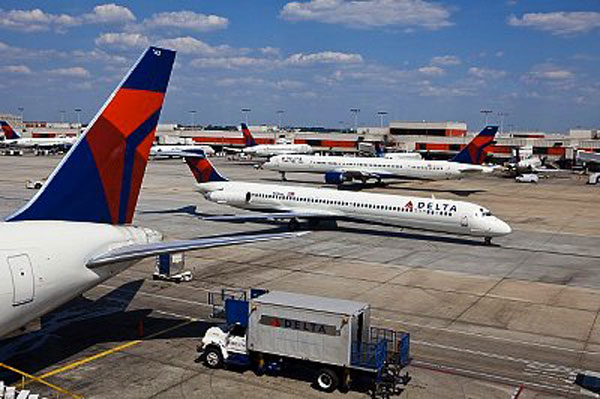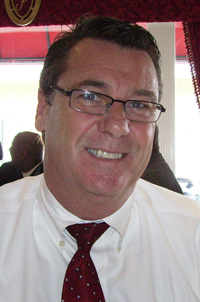|


 Having
arrived in Atlanta with Neel Shah to reshape Delta cargo, Ray Curtis
had rolled up his sleeves, and got to work for all of four months before
another, even bigger, challenge materialized in the form of the DL/NW
merger. Presently, nearing the end Q3 2011 DL cargo is in the final
phases of consolidation and continuous improvement. It goes without
saying that this affects customers, products and staff. Having
arrived in Atlanta with Neel Shah to reshape Delta cargo, Ray Curtis
had rolled up his sleeves, and got to work for all of four months before
another, even bigger, challenge materialized in the form of the DL/NW
merger. Presently, nearing the end Q3 2011 DL cargo is in the final
phases of consolidation and continuous improvement. It goes without
saying that this affects customers, products and staff.
The foundation of this success is having
a well-defined vision, credibility and connectivity with the customers,
based on developed relationships and ongoing dialogue, and the strategy
to deliver. It sounds beguilingly simple and straightforward –
and it seems to work.
We all need out tools – Ray says
that specialized sales management courses he took at the Kellogg School
of Management, a world class business school, have been invaluable in
shaping his approach and techniques. The main yardstick is the scorecard
coming from the customers; stripped of all hype the cargo business is
fairly uncomplicated. Was the shipment flown as booked? Was the information
about the shipment provided in a timely and effective manner? Are there
a high number of claims?
E-freight has become an integral component
of the scorecard as is Delta’s green policy that measures CO2
emissions. E-freight is monitored by country and station which goes
a long way to give management a real time view of how well is the organization
as a whole executing day-to-day. E-freight as a whole faces constant
challenges in the form of the resources and financial cost to implement
and manage it which in an industry operating with the slimmest of margins
remains underserved. Add to this the fact that for combination carriers,
traditionally, the passenger business gets most of the investment dollars.
Ray realized early on they needed to change
the entire business model. While the top 15 accounts contribute 80%
of the revenue, Delta treated everyone the same, regardless of the value
generated – whether a counter-to-counter Dash [flight specific
small express package service] or a shipment coming from a major forwarder.
The first steps were appropriate customer segmentation and customer
specific strategy.
The product offering has been refined
to suit specific requirements and criteria – take international
where customers can select among flight specific options “Equation”
for express, “Variation” for temperature sensitive freight
such as pharma, “Dimension” for general cargo and “Cohesion”-
the three way agreements with shipper, forwarder and airline. One example
is SNECMA/GE moving aircraft engine cowlings from a production facility
in France to Cincinnati, spanning shipment frequency and operational
requirements all held together with a tailored service level agreement.
FT: What are you saying
to customers when you go for their business?
RC: What
do you need Delta cargo to do? I need to be the voice of the customer
- I have to earn their trust. This also means balancing it with my responsibilities
to manage the sales force, 100 in-house and another 100 GSA [general
sales agents].
FT: What is the biggest
misunderstanding that people have about Delta Cargo?
RC: The
degree of transformation that has occurred here and will continue to
occur. In order to obtain and effectively manage freight from top accounts
we had and have to implement and deliver. Take technology - we didn’t
have it and has since been deployed – scanning in the warehouse
and CCTV [close circuit TV] to monitor high value cargo. This has added
visibility, accountability and reliability and the operational framework
to attract and handle such business.
FT: What are you doing
to develop temperature controlled cargo business?
RC: We
have a growing pharma business; when I came to Atlanta, there were no
coolers. There are now 4 and we will be adding two more.
FT: What is your view
on alliances?
RC: Well,
the Joint Venture was an interesting concept but it no longer suited
the time and our strategy. In the US, the customer still had to deliver
cargo to the various airline warehouses. We have made good progress
and have some shared warehouses. SkyTeam Cargo works better than ever,
but I think cargo alliances are in their infancy. Capital is certainly
one critical issue. We work very closely and remarkably well with AF/KL
cargo in a partnership that works to our mutual advantage.
FT: You have been
in cargo 30 years; who is the most unforgettable character you met and
why?
RC: Peter
Rose of Expeditors because of his vision and approach to business and
how focused he is on execution. He has been successful in taking the
Expeditors branding and consistency to the entire organization, whether
you are in one of their offices in Asia or in the US. Another person
is Bob Kmiotek, VP Route Management Transatlantic at DHL Global Forwarding
from whom I learned not to forget the people you work with; cargo in
the end is a people business
FT: Do the current currency fluctuations help or
hurt Delta?
RC: Yes.
Let’s look at fuel. Delta has learned and developed strategies
to manage and adjust everything from buying patterns, consumption and
the fleet. Once you identify such an obvious problem as the price of
oil, you can always do something about it.
The one constant is becoming better overall – it is a clear objective
and this cargo unit is very focused on delivering for its customers.
Ted Braun
|


